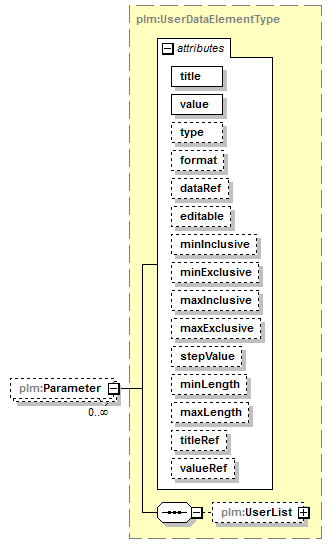| diagram |  |
||||||||||||||||||||||||||||||||||||||||||||||||||||||||||||||||||||||||||||||||||||||||||||
| namespace | http://www.plmxml.org/Schemas/PLMXMLSchema | ||||||||||||||||||||||||||||||||||||||||||||||||||||||||||||||||||||||||||||||||||||||||||||
| type | extension of plm:PropertiesBase | ||||||||||||||||||||||||||||||||||||||||||||||||||||||||||||||||||||||||||||||||||||||||||||
| properties |
|
||||||||||||||||||||||||||||||||||||||||||||||||||||||||||||||||||||||||||||||||||||||||||||
| children | plm:Description plm:ApplicationRef plm:Attribute plm:BoxBound plm:SphereBound plm:Bound plm:PropertyGroup plm:Transform plm:Parameter plm:InternalRep plm:CompoundRep plm:Material plm:EntityMaterial plm:TextureData plm:Texture plm:EntityTexture plm:EntityRef | ||||||||||||||||||||||||||||||||||||||||||||||||||||||||||||||||||||||||||||||||||||||||||||
| used by |
|
||||||||||||||||||||||||||||||||||||||||||||||||||||||||||||||||||||||||||||||||||||||||||||
| attributes |
|
||||||||||||||||||||||||||||||||||||||||||||||||||||||||||||||||||||||||||||||||||||||||||||
| annotation |
|
||||||||||||||||||||||||||||||||||||||||||||||||||||||||||||||||||||||||||||||||||||||||||||
| source | <xsd:complexType name="RepresentationType"> <xsd:annotation> <xsd:documentation> The Representation element in an PLMXML file refers to a model in some particular format, such as XT or jXT. It can refer to the model data in another file (an External Representation), or the data can be embedded within the Representation element in the XML file (an InternalRepresentation). It can also consist of a number of CompoundRep sub-elements. Attributes: format: data format revision: revision of data transformRef: has the same purpose as the Transform sub-element. Do not use both. location: URI of data source load: true if data is to be loaded at the same time as the PLMXML file. equivalentRef: an optional reference to a Representation which is equivalent to this one (for example, has the same shape). If this attribute is used, then it should collect together equivalent Representations into a ring, with each Representation using this attribute to point to the next in the ring. type: an optional attribute specifying type or purpose of the Representation. Supported values are: "default" - primary or design geometry. "simplified" - geometry of the simplified model. "flat" - geometry of the unfolded model. "user" - the inherited "name" attribute may be set to the name of an NX ReferenceSet, which implies the purpose of the geometry. Representation type can be used to distinguish between additional and alternative geometry at assembly level in the following way: "default"/"user" - If CompoundReps are all of type "construction", "weld" or "midsurface", then geometry should be treated additional. Otherwise - alternative. "simplified" - alternative. "flat" - Not expected at assembly level. baseRef: an optional reference to a Representation which is overridden by this Representation. propertyRefs: A list of references to Properties. Elements: PropertyGroup: A collection of Properties. Transform: optional Transform which positions the geometry in the coordinate frame of the owner. Parameter: Overrides the Parameters on FeatureTree representations. CompoundRep: the Representation may not have a single location. Instead, it may contain a number of CompoundRep sub-elements, each with its own location. The representation is the aggregate of these data sources. InternalRep: the Representation may contain one element derived from InternalRep, in which case it should not also have a location attribute. EntityRef: references to entities in the Representation file. These EntityRef elements can be referenced by RepresentationEntity elements. May also contain elements of type Material, EntityMaterial, TextureData, Texture, or EntityTexture. </xsd:documentation> </xsd:annotation> <xsd:complexContent> <xsd:extension base="plm:PropertiesBase"> <xsd:sequence> <xsd:element ref="plm:PropertyGroup" minOccurs="0"/> <xsd:element ref="plm:Transform" minOccurs="0"/> <xsd:element name="Parameter" type="plm:UserDataElementType" minOccurs="0" maxOccurs="unbounded"/> <xsd:element ref="plm:InternalRep" minOccurs="0"/> <xsd:element ref="plm:CompoundRep" minOccurs="0" maxOccurs="unbounded"/> <xsd:choice minOccurs="0" maxOccurs="unbounded"> <xsd:element ref="plm:Material"/> <xsd:element ref="plm:EntityMaterial"/> <xsd:element ref="plm:TextureData"/> <xsd:element ref="plm:Texture"/> <xsd:element ref="plm:EntityTexture"/> <xsd:element ref="plm:EntityRef"/> </xsd:choice> </xsd:sequence> <xsd:attribute name="transformRef" type="xsd:IDREF" use="optional" plm:refType="plm:Transform"/> <xsd:attribute name="format" type="plm:RepresentationFormatType" use="optional"/> <xsd:attribute name="revision" type="xsd:decimal" use="optional"/> <xsd:attributeGroup ref="plm:referenceGroup"/> <xsd:attribute name="equivalentRef" type="xsd:IDREF" use="optional" plm:refType="plm:Representation"/> <xsd:attribute name="type" type="plm:RepresentationTypeEnum" default="default"/> <xsd:attribute name="baseRef" type="plm:anyURIType" use="optional"/> <xsd:attribute name="propertyRefs" type="plm:uriReferenceListType" use="optional" plm:refType="plm:Property"/> </xsd:extension> </xsd:complexContent> </xsd:complexType> |
attribute RepresentationType/@transformRef
| type | xsd:IDREF | ||
| properties |
|
||
| source | <xsd:attribute name="transformRef" type="xsd:IDREF" use="optional" plm:refType="plm:Transform"/> |
attribute RepresentationType/@format
| type | plm:RepresentationFormatType | ||||||||||||||||||||||||||||||||||||||||||||||||||||||||||||||||||||||||||||||||||||||||||||||||||||||
| properties |
|
||||||||||||||||||||||||||||||||||||||||||||||||||||||||||||||||||||||||||||||||||||||||||||||||||||||
| facets |
|
||||||||||||||||||||||||||||||||||||||||||||||||||||||||||||||||||||||||||||||||||||||||||||||||||||||
| source | <xsd:attribute name="format" type="plm:RepresentationFormatType" use="optional"/> |
attribute RepresentationType/@revision
| type | xsd:decimal | ||
| properties |
|
||
| source | <xsd:attribute name="revision" type="xsd:decimal" use="optional"/> |
attribute RepresentationType/@equivalentRef
| type | xsd:IDREF | ||
| properties |
|
||
| source | <xsd:attribute name="equivalentRef" type="xsd:IDREF" use="optional" plm:refType="plm:Representation"/> |
attribute RepresentationType/@type
| type | plm:RepresentationTypeEnum | |||||||||||||||
| properties |
|
|||||||||||||||
| facets |
|
|||||||||||||||
| source | <xsd:attribute name="type" type="plm:RepresentationTypeEnum" default="default"/> |
attribute RepresentationType/@baseRef
| type | plm:anyURIType | ||
| properties |
|
||
| source | <xsd:attribute name="baseRef" type="plm:anyURIType" use="optional"/> |
attribute RepresentationType/@propertyRefs
| type | plm:uriReferenceListType | ||
| properties |
|
||
| source | <xsd:attribute name="propertyRefs" type="plm:uriReferenceListType" use="optional" plm:refType="plm:Property"/> |
element RepresentationType/Parameter
| diagram |  |
||||||||||||||||||||||||||||||||||||||||||||||||||||||||||||||||||||||||||||||||||||||||||||||||
| namespace | http://www.plmxml.org/Schemas/PLMXMLSchema | ||||||||||||||||||||||||||||||||||||||||||||||||||||||||||||||||||||||||||||||||||||||||||||||||
| type | plm:UserDataElementType | ||||||||||||||||||||||||||||||||||||||||||||||||||||||||||||||||||||||||||||||||||||||||||||||||
| properties |
|
||||||||||||||||||||||||||||||||||||||||||||||||||||||||||||||||||||||||||||||||||||||||||||||||
| children | plm:UserList | ||||||||||||||||||||||||||||||||||||||||||||||||||||||||||||||||||||||||||||||||||||||||||||||||
| attributes |
|
||||||||||||||||||||||||||||||||||||||||||||||||||||||||||||||||||||||||||||||||||||||||||||||||
| source | <xsd:element name="Parameter" type="plm:UserDataElementType" minOccurs="0" maxOccurs="unbounded"/> |
XML Schema documentation generated by XMLSpy Schema Editor http://www.altova.com/xmlspy